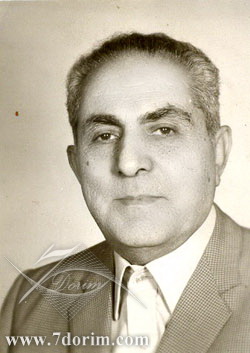
Lughman Mikael — Philanthropist and the manager of Tehran’s Beheshtiyeh Jewish Cemetery
Lughman Mikael was born in 1910 into a devout family in Tehran’s Sarechal neighborhood. His father, Eliyahu Mikael, was a servant and the founder of the Ezra Mikael Synagogue, one of the grand and beautifully adorned synagogues that was decorated with mirror works (i.e. Aina Kari) and located by the Oudlajan Bazaar.
Tragedy struck when Lughman was just ten years old, as his mother passed away, leaving a void of maternal love and affection, leading him to drop out of religious school. Soon after, his father remarried.
Things did not work out between Lughman and his stepmother — he left his paternal home, and his custody was transferred to his elder married brother. He started working before reaching maturity and spent his youth as an apprentice in a market stall.
After years of apprenticeship, he rented a small haberdasher shop. His determined efforts led to the expansion of his business, allowing him to acquire a larger space in the Moshir Khalvat Bazaar. Simultaneously, he occasionally took voluntary steps in social service and charitable activities, even organizing gatherings for these purposes in his marketplace chamber.
Lughman Mikael’s initial social endeavor began within the Molla Hanina Synagogue, where he aimed to assist the less fortunate families of the Oudlajan neighborhood. His admirable actions and reputation led his close friends, Abdallah (Na’ib) and Davoud Elghanian, to invite him to join a larger organization within the Chevra Society.

It is worth mentioning that before the establishment of the Tehran Jewish Committee, charitable bodies operated in synagogues under council-like structures. Among them, the most significant was the Chevra Society, which was established in 1931 in the Molla Hanina Synagogue. Later in 1939, this society formally adopted the name “Tehran Jewish Comittee”.
In 1951, in response to the disorganization in the affairs of Beheshtiyeh Jewish Cemetery of Tehran, the Tehran Jewish Committee introduced and appointed Lughman Mikael as the cemetery manager.
In undertaking this responsibility, Lughman Mikael managed the cemetery with utmost sincerity and dedication, without expecting compensation. He played an instrumental and positive role, particularly in the reconstruction of the cemetery, even relocating his residence closer to the area on Jaleh Street.
Lughman Mikael married his paternal cousin Nusrat Mikael in 1936. This union resulted in four sons. His third son, Iskandar Mikael, follows in his father’s footsteps as a philanthropist and has taken on significant responsibilities within the Tehran Jewish Committee for years. Like all her family members, Nusrat Mikael is also known for her altruistic endeavors and active contributions to the community.
In 1981, after years of tireless efforts and enduring hardships, Lughman fell ill to the point where he struggled to manage the Beheshtiyeh Jewish Cemetery. His natural desire to serve the community was hindered by his health, prompting him to step down from his role as manager despite his passion. At the recommendation of the Jewish Committee, he continued to contribute in a non-profit advisory role.
He was initially involved with the veterans affairs of the Committee, then turned his attention to the Elderly Home. He took charge of overseeing the construction of a hall for matzo cooking outside the Elderly Home. Additionally, he consistently took the initiative, as in past years, to collect donations for the needs of the Jewish community.
Lughman Mikael firmly opposed the division of graves into sections for the rich and poor. He believed that such actions contradicted the principles of the ancient Jewish community. Lughman always advocated for preventing the Beheshtiyeh Jewish Cemetery — the home of the afterlife — from becoming a symbol of inequality and a place where only a few would unjustly claim land without religious considerations and for the sake of showing off their wealth. He aimed to prevent a minority group from seizing the vast lands of the cemetery and constructing private homes without adhering to religious principles.
Eventually, Lughman succumbed to lung cancer after enduring a difficult battle, bidding farewell to this world in the winter of 1986 at the age of 76. He was left to rest at the same place he had dedicated many years of his life — the Beheshtiyeh Jewish Cemetery.


 فارسی
فارسی